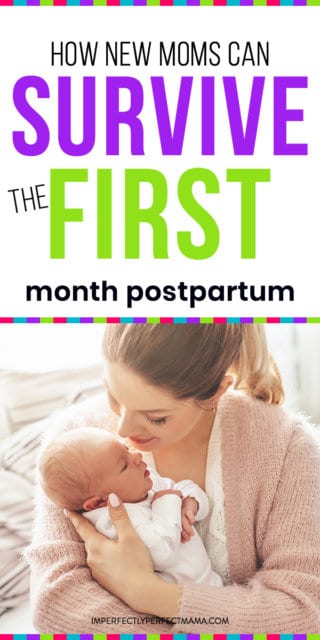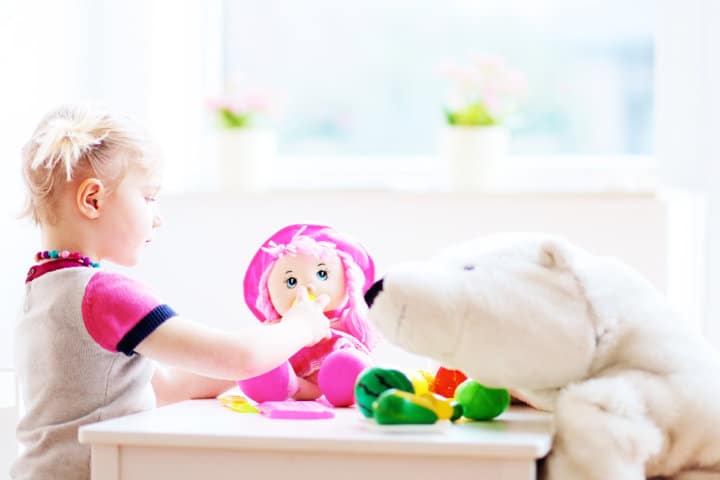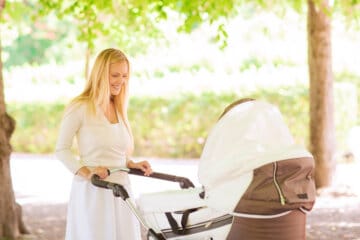Congratulations! You made it through childbirth and are now snuggling at home with your new baby.

In a perfect world, every new mama would have live-in help for several weeks after delivery. Then you wouldn’t have to worry about a thing except nursing your new little one and recovering.
Unfortunately, this sort of help rarely happens in today’s day and age. More often, reality means you’re home alone after two or three days.
Trying to recover in your first month postpartum.
While you’re keeping all your other kids alive, fed, and engaged, and trying to bond with a newborn – you have to get the hang of breastfeeding again.
It’s overwhelming!
If you find yourself in this position, here are nine easy tips to help you through your first month home with a newborn.
1. Manage Your After Pains
Childbirth hurts. But, at least you get to snuggle with an adorable baby at the end. That makes it worth it.
After pains? Those are terrible. And the more kids you have, the worse they get.
I used to feel horrible. After surviving labor and all those pains, nursing my newborn brought tears to my eyes. This pain felt way worse than delivery.
Getting your uterus back down to size hurts! And every time your precious new bundle of joy latches on, the pain intensifies.
Moral of the story? It’s okay to take something for your pains after birth, even if you’re one tough mama. Keep taking it for at least a week, and longer if you need it.
My top choice for this type of pain relief is Contract Ease from TriLight Health. It has a definite woody taste, but it made my pains almost completely disappear, offering more relief than any standard over-the-counter pain med I tried.
2. Make a List of Things People Can Help With
I know you’re Supermom and believe you can do it all. And you try hard to do it, no matter how much you’re hurting or need rest.
But, it really is okay to ask for and accept help. So, if any friends or family members ask what they can do, tell them.
Ask them to tackle a load of laundry. Or take your other little ones to the park for a couple of hours.
Maybe you’re in desperate need of a new gallon of milk and a loaf of bread. Ask someone to stop by the store for you on their way to visit the cute little baby.
Make a list now of tasks you can delegate. Then you’ll be prepared when someone asks.
Because if you try to think of something for them to do when you’re completely overwhelmed you’ll draw a blank. You’ll mutter something about being okay and having everything under control and let your help walk away.
Don’t do that!
3. Rest Mama, Rest!

Your body just went through the wringer. You need rest.
I know it’s not always possible to get sleep during this season, but you can make rest a priority with a few modifications.
When you sit down, prop your feet up to help reduce the swelling. Camp out in a comfortable chair in the living room and let life happen around you while you watch.
Or use the couch as your daytime base. You need a space where you can sit comfortably, put your feet up, and stay for long periods of time.
Then, turn on the television and let the screen help keep the other kids from running around destroying the house. You can always wean them back off the screen later. For now, it’ll help you get the rest you need.
At night, rest as much as possible even while you’re feeding the baby. You don’t have to wake completely up and make it harder for yourself to go back to sleep when baby drifts off again.
Limiting middle of the night screen time can help.
4. Streamline As Much As Possible
You cannot jump back into your normal busy schedule as soon as you come home with a new baby. There is an adjustment period after each new addition.
To help keep your head above water during this first month postpartum, cut as many tasks as you can from your must-do list. Then, streamline the rest.
Get a plan in place for breakfast and lunch, so you don’t have to think about those meals.
If you don’t have a meal train coming in, do the same thing for dinner. Before you have your baby, stock up on what you need for at least two weeks of these simplified meals.
Decide what your top two priorities are for housework.
The bathroom and kitchen are always the top of my list, and I delegate tasks to each of my kids to help keep those areas livable.
If you’re a blogger or business owner, take steps to cut back while you recover.
Utilize guest bloggers or work ahead as much as possible before delivery. Notify your clients that you’re having a baby, so everyone is in the loop. Then take some time off during your postpartum period.
When you do have to get up and do something, use a timer. You want to limit how much time you spend walking around, so limit yourself to ten minutes of activity at a time.
Then go sit back down and rest for a while. Baby steps are definitely important postpartum.
There will be time later to do everything else, I promise! Right now, your focus has to be on recovery and bonding.
5. Keep It Simple
Now is not the time for fancy meals and Pinterest perfect projects. It’s the time for simple.
Which means your expectations might need lowered.
Proactively decide that you’re going to keep things simple. Embracing this decision means you won’t feel nearly as guilty about the temporary changes.
You might consider:
- Using paper plates, disposable cups, and plastic cutlery to reduce meal time clean up
- Having a stock of frozen food on hand that cuts your preparation time
- Letting, “kid-clean,” be clean enough
- Eating more convenience food than normal
- Order your groceries online and let your husband pick them up on his way home from work
- Use Amazon Prime for anything you forgot to buy so you don’t have to run to the store with a newborn in tow
Think about everything you have to do, and brainstorm ways to make each task easier on yourself.
6. Listen to Your Body
There’s so much blood in the postpartum period.
Embrace those huge old pads and grannie panties without guilt or embarrassment.
Despite the discomforts of it, your bleeding has a very useful purpose. It gives you a peek into the state of your body. If your bleeding has slowed, and it suddenly picks up again vigorously, you are doing too much.
Stop trying to do everything and give your body the rest it needs.
Listen to your body and the signals it sends you. Watch carefully for any signs of infection, and be in touch with your doctor as needed.
Your self-care is important.
I know you normally focus much more on everyone else than on yourself but take this time for you now. Your recovery will be much better (and shorter) if you do.
7. Have a List of Ideas to Keep Your Other Kids Engaged

Even with an increase in screen time, your kids will need some activities during the day.
Make a list of age-appropriate ideas now, so when the time comes you aren’t trying to think of things off the top of your head.
A while back I made a list of over 100 different creative ways to engage kids. They’re things I have my kids do while I write, but many of them are perfect for independent play while you recover as well.
Here are five of my kids’ favorites from the list to help get your list started:
- Using crayons to decorate a big box and turn it into something else
- Building flat pictures (mosaics) with LEGOs
- Setting up the train tracks and free playing with them
- Solo play with the pieces to a board game
- Throw a blanket over the table to make a fort and stick a basket of books under there
Think about the ages and abilities of your other kiddos while you make your list. That way you only have tasks that are perfect for them.
You can also utilize your older kids to play with the younger ones.
I call this time sibling play time, and it’s a favorite around here. Just make sure to keep this time fairly short (thirty minutes works in my family) so it stays fun and doesn’t turn into a battle.
8. Take Care of Your Boobies
Nursing is hard, but rewarding. The first few weeks of breastfeeding are typically the worst as far as pain goes.
Keep some lactation friendly nipple cream nearby, and apply it liberally to help avoid cracks.
After trying plenty of different brands, I found plain coconut oil worked the best for me. Experiment to see what helps the most and then stick with it.
Move baby around and see what positions are most comfortable. No matter which position you use, always make sure baby is latched on correctly.
Failure to do so will result in really sore boobies! Talk to a lactation counselor if you need to, or find a video online.
If you’re struggling to remember which side you need to start with, get a simple paperclip. Clip it onto your bra strap on the side you started with first.
When it’s time to nurse again, move the paperclip to the other bra strap.
It’s really important to keep switching starting sides, because otherwise you can wind up with a clogged duct. If that happens, hot showers help. Increased nursing does as well.
Examine your breasts fairly regularly and check for sore spots or redness.
Talk to your doctor about anything that concerns you, because mastitis is a possibility.
As your milk comes in, you might wake up with really full boobs. When you’re engorged, the milk might come out too quickly for your little newborn.
If this happens, manually express some of your milk first to help relieve the pressure. Then let your baby latch on and take care of the rest.
Keep breast pads nearby so you can pop in a new pair when one is saturated. This will help keep wet spots off your shirts, and make you more comfortable.
If you have other kids, your nursing time is when they’re most likely to act up. They know you’re busy!
If you’re able to read them a story or snuggle for a few minutes first, that’ll help.
They are also going through some adjustments and need to know that you still love them. Find an engaging activity for them and sit them down nearby until you all get back in the swing of things.
Praise them for playing quietly, and for doing their part to help their new little brother or sister grow. Positive words help a lot.
9. Remember to Hydrate!
Fill a big jar or your favorite bottle with water, and keep it nearby. You need water to help you heal and make milk, so you need to drink more than you usually do.
If you don’t like the taste of your tap water, buy some bottles.
Or put in a filter before you give birth. Adding a touch of lemon juice also helps improve the flavor.
Of course, you’ll also have to pee often when you’re drinking this much water. This is good and helps flush out your system. Keeping your bladder empty prevents it from putting pressure on your sore spots.
Rejoice in the Fact that Very Soon You’ll Discover a New Normal

The first few weeks after having a baby are tough. You’re exhausted, sore, and dealing with loads of hormones and emotions.
You might even wonder what in the world you were thinking of having another baby.
Don’t worry! This is normal. You’re overwhelmed and trying to find your way.
The good news?
This is temporary.
You will discover a new normal for your family. One that is better than ever, because it now includes your adorable bundle of joy.
So take it one day at a time, and don’t worry about everything you didn’t get done. Instead, focus on the snuggles. And the smell of your precious newborn. Take it all in.
You’re doing important work, even if it feels like you got nothing done.




Leave a Reply